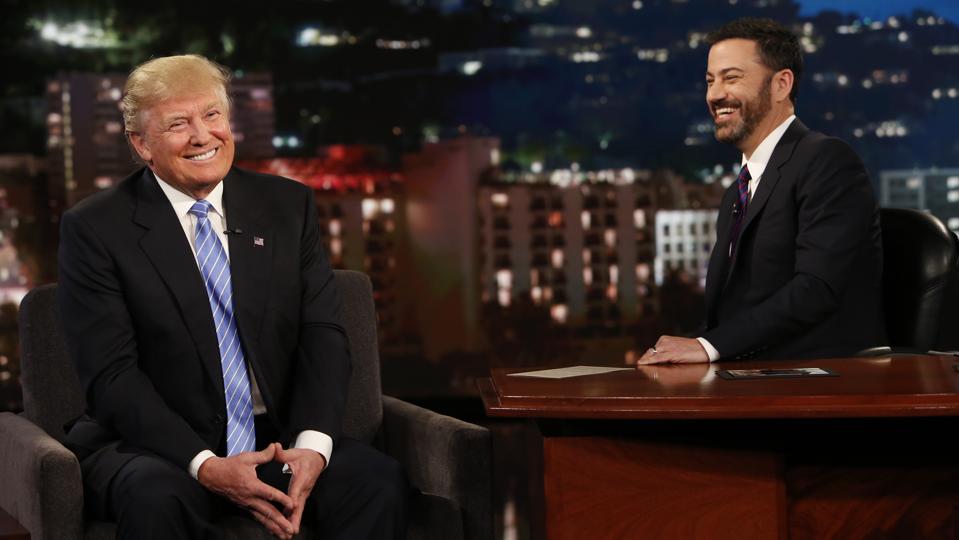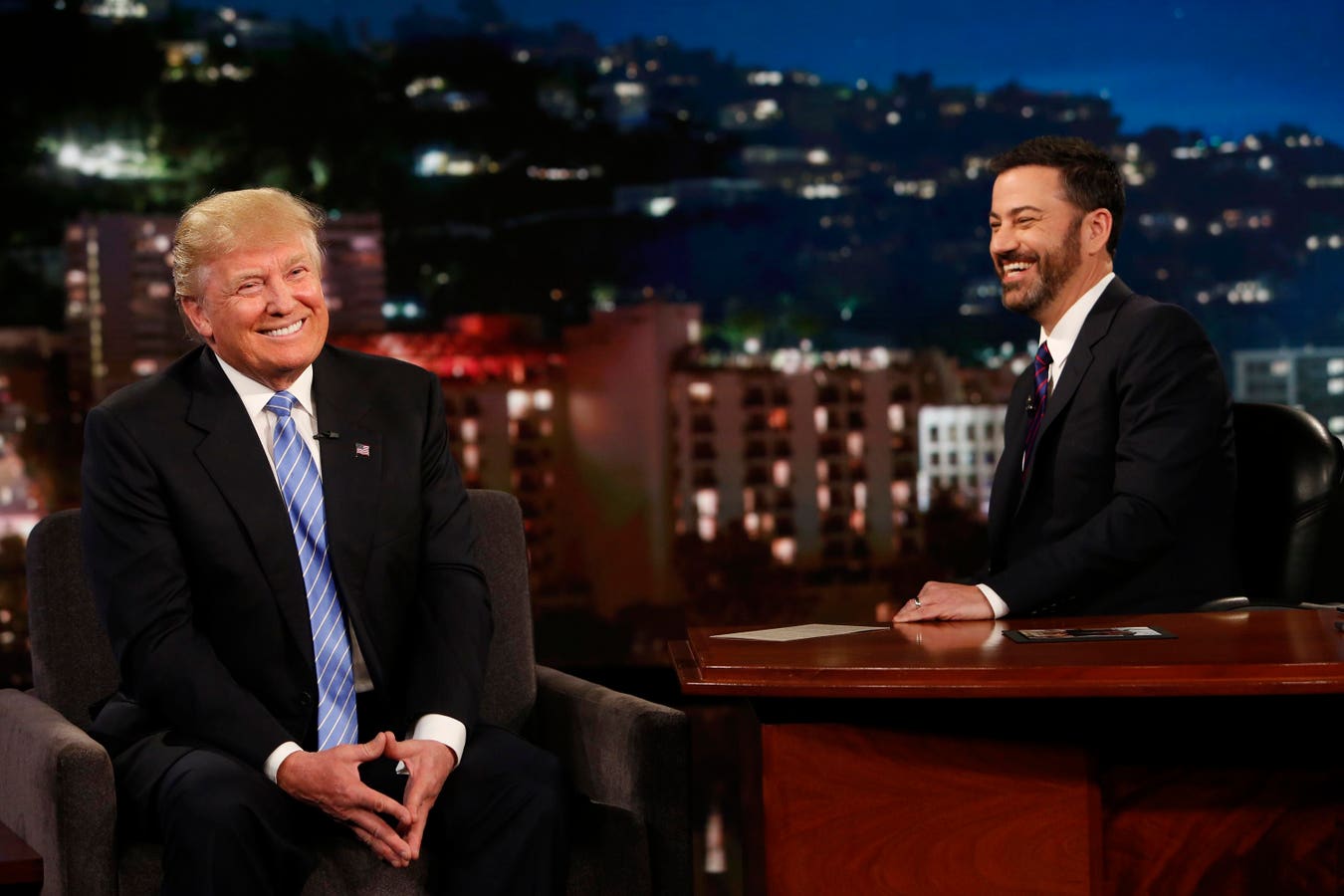
The cancellation of “Jimmy Kimmel Live!” by ABC and Disney stirred the broadcast industry, with competitors seizing the moment amid growing political unrest.
Disney General Entertainment Content via Getty Images
The decision by the American Broadcasting Company (“ABC”) and its parent entity, the Walt Disney Company (“Disney”) to suspend production of Emmy-winning late-night talk show “Jimmy Kimmel Live!” caused a ripple effect in the broadcast industry, already strained with political friction. With big brother watching, it seems Nexstar Media Group (“Nexstar”) is leveraging the controversy to its advantage.
Nexstar’s Gesture to The (Capitol) Hill
Following comments made by comedian Jimmy Kimmel accusing the “MAGA gang” of using the assassination of conservative activist Charlie Kirk for political gain, ABC and Disney temporarily pulled the program on September 17, 2025, forcing broadcasting networks to air alternative programs in place of the live show. Less than a week later, Disney resumed production of Kimmel’s show, and while many have reverted to normal programming, Nexstar is among the few that have indefinitely remained on pause.
As a large advertising spender for Disney and one of its most prized affiliates, Nexstar’s decision is seemingly drawing a line in the sand. Part of the motive emanates from the alleged alienation of its viewers, being a broadcaster in many local swing markets. However, this decision may also be a strategic business move to signal loyalty to the administration as it makes a move to formally acquire Tegna, Inc. in 2026.
The Shot Heard Round the Broadcast Industry
Nexstar’s founder Perry Sook, a vocal supporter of the FCC, could be exploiting the current turmoil to advance the company’s bid for Tegna.
WireImage
Following the resumption of Kimmel’s broadcast, President Trump threatened ABC in a Truth Social post, stating, “I think we’re going to test ABC out on this. Let’s see how we do. Last time I went after them, they gave me $16 Million Dollar” (the millions a reference to the defamation lawsuit won against ABC anchor George Stephanopoulos for on-air assertions). FCC Chairman Brendan Carr echoed that sentiment, reaffirming his commitment to enforcing the “public interest rule,” which requires broadcasters to avoid promoting biased ideology. The issue, however, is that no clear definition currently exists to govern what that rule actually entails.
The recent turmoil is another nail on the coffin for the media industry, already on edge as the FCC’s seems to be targeting left-leaning outlets. These concerns were present in the Paramount Skydance Corporation merger, through which CBS was required to provide free advertising to Trump and hire an ombudsman to ensure that the network remained unbiased. Once again, these concerns were voiced over the fate of CNN as recent rumors emerged over Paramount Skydance Corporation’s bid for Warner Bros. Discovery.
In August, Nexstar Media Group announced a comparable acquisition of Tegna, Inc., a move that will rely heavily on remaining favorable in the eyes of the administration. At play are Nexstar’s ownership of cable news network NewsNation and digital paper The Hill, both generally centrist-leaning in political views–though NewsNation’s Chris Cuomo has been at odds with Trump. Pulling politically charged programming could signal the corporation’s willingness to censor content under the guise of serving the “public interest.” Nexstar founder Perry Sook has previously expressed support for this approach, having voiced hope that the new administration would curb what he called “the level of activist journalism out there.”
The acquisition of Tegna will likely raise anticompetition concerns, allowing it to further surpass its competitors. Nexstar oversees nearly 200 television stations, making it the largest television station owner in the country. Sook has previously applauded the administration’s efforts to “level the playing field and compete more effectively,” allowing for local broadcasters like Nexstar, to expand their reach against larger media players. Following in the playbook of Skydance’s David Ellison, Nexstar may be strategically playing its cards by blocking “Jimmy Kimmel Live!” to avoid drawing attention to its potential market monopolization.
The Future of Broadcasting
By pulling Kimmel’s show, Nexstar has sparked debate over how much control large affiliate owners hold and whether national broadcasters can truly remain autonomous under such relationships.
AFP via Getty Images
It is easy to chalk Nexstar’s protests up as an attempt to capitalize on the situation at hand for their own gain in the market. However, the implications of this move are far-reaching.
National networks like ABC have no hold broadcast licenses and are at the mercy of their local affiliates to decide what airs to which markets. This friction could trigger a shift in power from the big players in the industry to the affiliate owners. Nexstar, Sinclair Broadcast Group, and others preempting Kimmel’s show raises concern about autonomy under large affiliate ownership. When station groups have the power to censor content, that censorship risks narrowing the diversity of viewpoints available to the public. The question at hand is whether affiliates may continue to exert their control over national content, and if they do, will it change the longstanding structure of network–affiliate relationships?
This is not just an industry problem. It impacts every American. Broadcast TV is supposed to provide freely accessible national programming, but when content is selectively filtered, it deepens media polarization and strips viewers of the ability to choose what they watch for themselves. Should Nexstar succeed in acquiring Tegna, this may be amplified on a larger scale, proving they will do whatever it takes to become a powerplayer.

